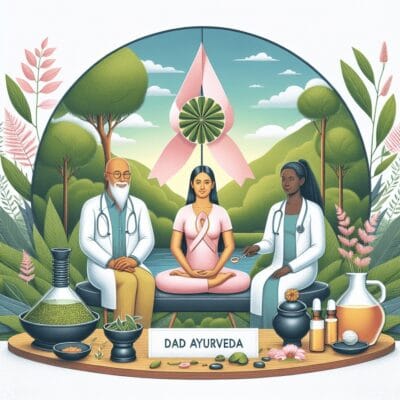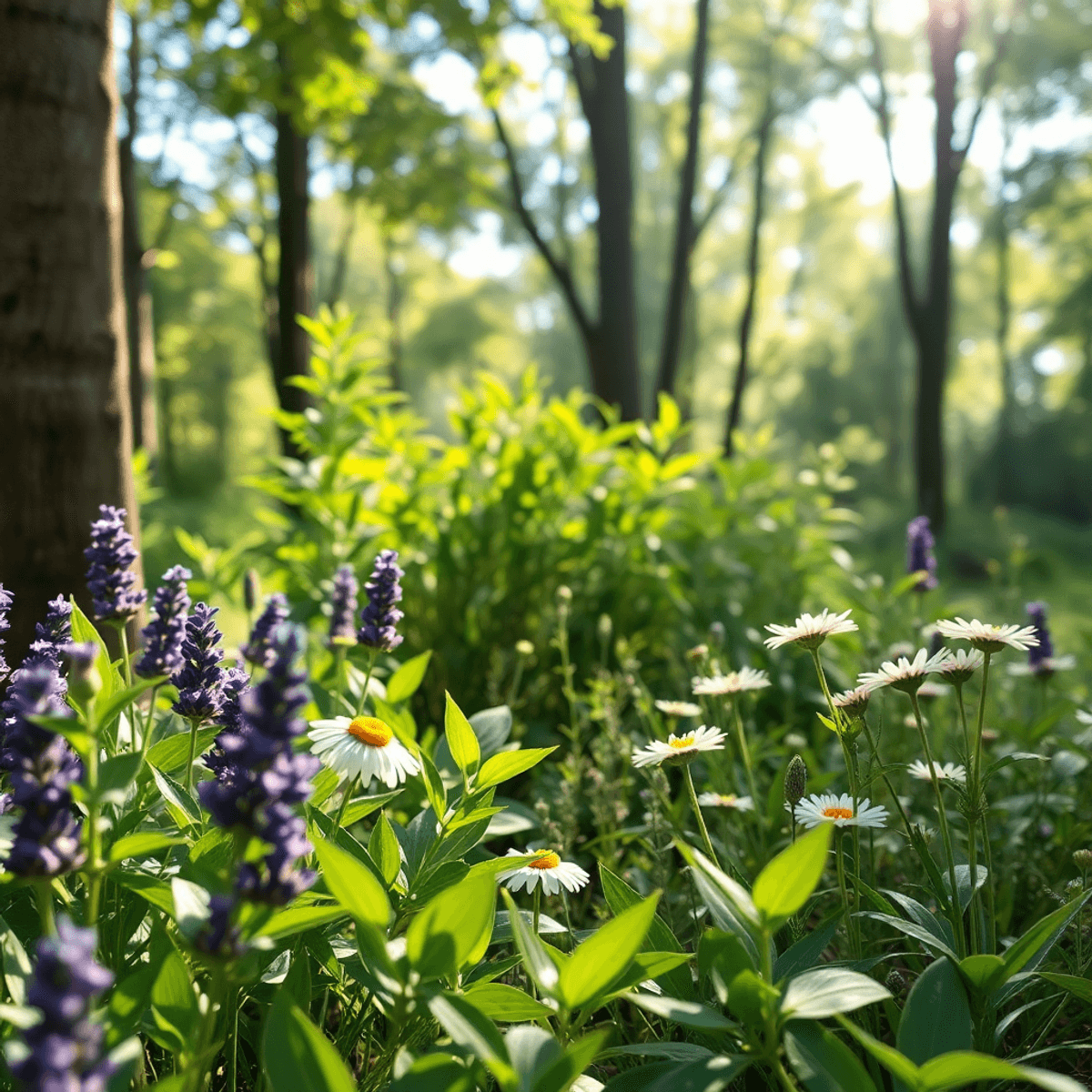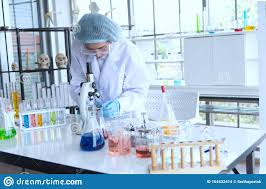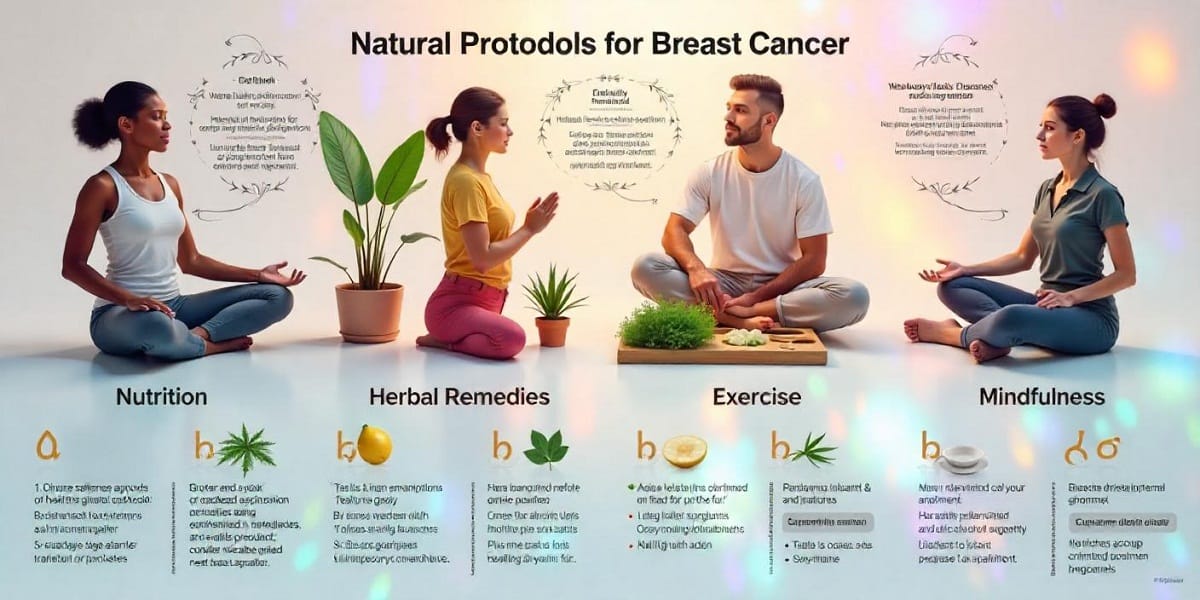Cancer
Natural Protocols for Breast Cancer
Natural Protocols for Breast Cancer
Natural protocols for breast cancer involve using natural products and lifestyle changes to support treatment and recovery. These methods include plant-based compounds like curcumin and genistein, which have shown promise in slowing down cancer cell growth and triggering cell death.
A holistic approach is crucial, combining traditional medical treatments with alternative therapies. This combination aims to improve overall treatment results and enhance the well-being of patients. By focusing on a comprehensive strategy, we can address various aspects of health—physical, emotional, spiritual, and mental.
In this article, you will discover:
- How natural recommendations can support breast cancer health.
- Insights into multiple survival aspects: emotional, physical, spiritual, and mental.
- Practical guidance on implementing these natural protocols effectively.
Explore the essentials of integrating natural protocols with conventional care to empower yourself or your loved ones in navigating breast cancer treatment.
Pankaj Rohilla: CEO/Owner – Author – Naturopath – Disha Arogya Dham
Pankaj Rohilla is a source of hope and inspiration in the world of breast cancer awareness and natural treatment methods. He is a multifaceted professional who combines his experiences as a Cancer Survivor, giving him a deep understanding of the emotional and physical struggles involved in battling this disease. His own journey through cancer has influenced his career, enabling him to connect with others facing similar obstacles.
1. CEO/Owner
Pankaj leads with vision and determination, utilizing his leadership skills to drive organizations that focus on holistic health solutions. His role as a CEO is crucial in spreading awareness about natural therapies for cancer treatment.
2. Author
Through his written works, Pankaj shares invaluable insights into the world of naturopathy and breast cancer survival. His books are filled with personal stories, scientific research, and practical advice, making complex topics easy to understand for everyone.
3. Naturopath
With a strong belief in the healing power of nature, Pankaj practices naturopathy to guide individuals towards holistic health. His knowledge of natural remedies empowers patients to explore alternative methods alongside traditional treatments.
4. Speaker
As an engaging speaker, Pankaj captivates audiences with his compelling story and expert knowledge. He frequently speaks at conferences and seminars, advocating for integrative approaches to cancer care.
Pankaj Rohilla’s diverse career not only exemplifies resilience but also highlights the transformative potential of combining personal experience with professional expertise in addressing breast cancer.
What You’ll Learn
Understanding the intricacies of breast cancer is crucial for effective management and recovery. Here’s what you’ll delve into:
- Identify how cancer begins: Gain insights into the cellular processes that lead to the onset of cancer. Explore the initial stages of transformation from normal cells to malignant ones.
- Learn how cancer grows: Discover the mechanisms that allow cancer cells to proliferate uncontrollably. Understand how they bypass normal regulatory processes and sustain their growth.
- Explain and identify breast cancer risk factors: Uncover the various risk factors associated with breast cancer, ranging from genetic predispositions to lifestyle influences. Learn how these factors contribute to the development and progression of the disease.
- Explore breast cancer treatment options: Examine a range of treatment modalities, including conventional approaches like surgery, chemotherapy, and radiation, as well as innovative natural protocols.
- Lifestyle changes and stress-reducing strategies: Investigate practical lifestyle modifications that can support treatment outcomes. This includes dietary adjustments, physical activity recommendations, and stress management techniques.
This comprehensive exploration empowers you with knowledge on several fronts, providing a holistic view of breast cancer treatment and survivorship strategies. Through this understanding, you are better equipped to navigate the complexities of breast cancer care.
Learn Natural Recommendations for Breast Cancer Health Including Why They Work and How to Apply Them
Exploring natural protocols for breast cancer involves understanding their benefits and practical application. Many of these recommendations focus on harnessing the power of natural compounds and lifestyle modifications to support treatment. Here’s a look at some key aspects:
Nutritional Supplements
- Curcumin: Derived from turmeric, curcumin is known for its anti-inflammatory and antioxidant properties. It may help inhibit cancer cell growth by interfering with specific cell signaling pathways.
- Genistein: Found in soy products, genistein could play a role in reducing tumor growth due to its ability to modulate estrogen receptors.
- Lycopene: This powerful antioxidant, present in tomatoes, may protect cells from damage and enhance the effectiveness of certain cancer treatments.
Herbal Compounds
- Apigenin: Present in chamomile and parsley, apigenin has been shown to induce apoptosis in cancer cells, potentially inhibiting their spread.
- Green Tea Extract: Rich in polyphenols, green tea extract may slow the progression of cancer cells while supporting overall immune health.
Lifestyle Interventions
- Engaging in nature-based physical activities such as walking in parks can improve mental well-being and physical fitness.
- Incorporating resistance training along with aerobic exercises weekly enhances muscle strength and supports cardiovascular health.
Applying these recommendations requires a tailored approach, considering individual needs and ongoing medical treatments. Consulting with healthcare professionals ensures that natural protocols complement conventional therapies effectively.
Understanding the Different Aspects of Breast Cancer Survival
Surviving breast cancer involves more than just overcoming a physical illness; it encompasses a holistic journey through emotional, physical, spiritual, and mental dimensions. Each aspect plays a crucial role in enhancing the quality of life and fostering resilience.
Emotional Aspects
- Support Systems: Engaging with support groups or therapy can provide emotional relief. Sharing experiences with others who understand can alleviate feelings of isolation.
- Emotional Expression: Encouraging open communication about fears and hopes helps in processing emotions effectively.
Physical Aspects
- Exercise: Regular physical activity is essential. It aids in recovery, reduces fatigue, and enhances mood. Consider incorporating nature-based activities to boost well-being.
- Nutrition: A balanced diet rich in fruits, vegetables, and natural supplements supports overall health and recovery.
Spiritual Aspects
- Mindfulness Practices: Techniques such as meditation or yoga can offer peace and spiritual grounding. They also aid in stress reduction.
- Personal Beliefs: Leaning on personal faith or spirituality can provide inner strength and motivation during challenging times.
Mental Aspects
- Cognitive Health: Mental exercises like puzzles or reading help maintain cognitive functions.
- Positive Mindset: Focusing on gratitude and positive affirmations boosts mental resilience.
Understanding these facets ensures a comprehensive approach to breast cancer survival, where integrating each aspect leads to a more fulfilled life post-diagnosis. Recognizing the interconnectedness of emotional, physical, spiritual, and mental health is key to thriving beyond the illness.
Introduction
Disclaimer: This article provides insights into natural protocols for breast cancer and is intended for informational purposes only. It is crucial to consult with healthcare professionals before making any changes to your treatment plan.
Meet the Instructor: Diana Wright ND
Diana Wright, a respected Naturopathic Doctor, shares her expertise on integrating natural protocols with conventional breast cancer treatments. Her approach emphasizes personal responsibility and informed decision-making in the cancer journey.
Cancer begins when cells in the body start to grow uncontrollably. Unlike normal cells, cancerous cells do not stop growing or die, leading to tumor formation. Recognizing how cancer grows is critical for developing effective treatment strategies.
Emerging research suggests a link between fungus and cancer development, particularly through the production of calcium oxalate crystals. These crystals may contribute to the progression of tumors by creating an environment that supports cancer cell growth.
Incorporating these elements into a holistic approach can empower individuals to take charge of their health. By understanding the underlying mechanisms of cancer and exploring additional support options through natural protocols, you can make more informed choices about your treatment journey.
Understanding Breast Cancer
Breast cancer is a complex disease characterized by the uncontrolled growth of cells in breast tissue. This illness affects millions worldwide and is one of the most commonly diagnosed cancers among women. While men can also develop breast cancer, it remains significantly rarer in male populations.
Types of Breast Cancer
Understanding breast cancer begins with recognizing its various types, including:
- Invasive Ductal Carcinoma (IDC): The most common form, originating in the milk ducts and spreading to surrounding tissues.
- Invasive Lobular Carcinoma (ILC): Starts in the lobules, where breast milk is produced, and can spread to nearby areas.
- Triple-Negative Breast Cancer: Lacks three common receptors known to fuel most breast cancer growths; often more aggressive.
Factors Contributing to Breast Cancer Development
Several factors contribute to breast cancer development, with genetic mutations such as BRCA1 and BRCA2 playing a significant role. Environmental influences and lifestyle choices are also critical components in understanding risk.
Impact of Breast Cancer
Breast cancer’s impact extends beyond physical health, affecting emotional and mental well-being. Many patients experience anxiety and depression following diagnosis, underscoring the importance of supportive care.
Importance of Early Detection
Advancements in screening methods like mammograms have enhanced early detection capabilities. Early diagnosis is crucial as it increases treatment options and improves survival rates.
Risk Factors
Understanding the risk factors associated with breast cancer is crucial for both prevention and early detection. These factors can be divided into several categories:
Genetic Factors:
- Family History: Having a first-degree relative with breast cancer increases your risk.
- Genetic Mutations: BRCA1 and BRCA2 gene mutations significantly heighten the likelihood of developing breast cancer.
Hormonal Factors:
- Reproductive History: Early menstruation (before age 12) or late menopause (after age 55) are linked to increased risk.
- Hormone Replacement Therapy (HRT): Long-term use of HRT has been shown to elevate breast cancer risk.
Lifestyle Factors:
- Diet and Nutrition: Diets high in saturated fats and low in fruits and vegetables may contribute to higher risk levels.
- Physical Activity: Sedentary lifestyle is associated with an increased risk, highlighting the importance of regular exercise.
Environmental Factors:
- Exposure to Radiation: Previous radiation therapy to the chest area, especially during childhood or young adulthood, raises the risk.
- Chemical Exposure: Some studies suggest that exposure to certain chemicals, such as those found in pesticides or industrial pollutants, can increase risk.
Recognizing these factors allows for informed decisions regarding lifestyle changes and preventive measures. Identifying personal risk factors can also guide discussions with healthcare professionals about appropriate screening methods.
The Most Important Recommendations
Integrating natural protocols into breast cancer treatment can yield significant benefits. Here are some key recommendations to consider:
1. Incorporate Phytochemicals:
Natural compounds such as curcumin, genistein, lycopene, and apigenin have been recognized for their anti-cancer properties. These phytochemicals may help inhibit tumor growth and induce apoptosis in cancer cells, making them valuable additions to a supportive care regimen.
2. Engage in Nature-Based Physical Activity:
Participating in activities like walking in natural settings can significantly enhance both physical and mental well-being. Aim for 150–300 minutes of moderate-intensity aerobic exercise weekly, supplemented by resistance training to improve overall fitness and quality of life.
3. Embrace Stress Reduction Techniques:
Managing stress is crucial in the fight against breast cancer. Practices such as yoga, meditation, and deep-breathing exercises can promote relaxation and support emotional resilience, contributing to improved treatment outcomes.
4. Focus on Nutrition and Supplementation:
A balanced diet rich in antioxidants, vitamins, and minerals plays an essential role in supporting the body during treatment. Consider supplements that provide essential nutrients while consulting with healthcare professionals to ensure safe integration with conventional therapies.
These recommendations underscore the importance of a holistic approach, enhancing traditional treatments with natural strategies aimed at improving the overall health and well-being of breast cancer patients. Each element serves a unique purpose, contributing to a comprehensive plan that empowers individuals on their journey to recovery.
Conventional Treatments
Conventional treatments for breast cancer are still the main medical methods used to treat the disease. They offer proven ways to manage the condition. These treatments usually involve a combination of:
- Surgery: This aims to remove cancerous tissues. There are two options: lumpectomy, where only the tumor is removed, or mastectomy, which involves removing the entire breast.
- Radiation Therapy: This uses high-energy rays to target and destroy cancer cells. It is typically recommended after surgery to eliminate any remaining cells.
- Chemotherapy: This involves using drugs to kill rapidly dividing cancer cells. Chemotherapy can be given before (neoadjuvant) or after (adjuvant) surgery.
- Hormonal Therapy: This is effective for hormone receptor-positive breast cancers. Medications like tamoxifen and aromatase inhibitors block or lower estrogen levels to slow or stop cancer growth.
- Targeted Therapy: This focuses on specific characteristics of cancer cells, such as proteins that allow them to grow in a more targeted way compared to chemotherapy. Drugs like trastuzumab (Herceptin) are used for HER2-positive breast cancers.
Each treatment has its own benefits and possible side effects. Your healthcare team will customize these options based on factors like cancer stage, type, overall health, and personal preferences.
Overview of Natural Treatments
Natural treatments for breast cancer often use a combination of methods that work alongside traditional medical treatments. These approaches aim to boost the body’s natural healing abilities and promote overall well-being.
Key Components:
- Phytochemicals: Compounds such as curcumin, genistein, lycopene, and apigenin have been recognized for their potential to inhibit cancer cell growth. They achieve this by inducing apoptosis and disrupting pathways linked to cancer stem cells (CSCs).
- Nature-Based Physical Activity Programs: Engaging in regular physical activities, especially those conducted in natural settings, can significantly enhance physical fitness and mental health. Recommendations suggest 150–300 minutes of moderate-intensity aerobic exercise weekly paired with resistance training to boost life quality.
- Herbal Compounds: Natural herbs play a role in targeting breast cancer stem cells, particularly those resistant to standard therapies. For instance, curcumin disrupts CSC signaling pathways, offering a supportive boost to traditional treatments.
These methods are designed not as replacements but as complementary measures that enrich the efficacy of conventional treatments. By integrating these natural protocols, individuals may experience improved treatment outcomes and an enhanced quality of life during recovery. This holistic approach emphasizes the synergy between body, mind, and nature in combating breast cancer.
Lifestyle Changes
Making changes to your lifestyle can be a game-changer when it comes to supporting breast cancer treatment and recovery. Here are some key areas to focus on:
Dietary Adjustments
Eating a balanced diet is crucial for boosting your immune system and providing essential nutrients. Include plenty of vegetables, fruits, whole grains, and lean proteins in your meals. Foods rich in antioxidants like berries, nuts, and green leafy vegetables can also help reduce inflammation.
Regular Physical Activity
Incorporating regular exercise into your routine is another important factor. Aim for 150–300 minutes of moderate-intensity aerobic exercises such as brisk walking or cycling each week, along with resistance training. This combination can improve both your physical fitness and mental health. Research shows that exercise can reduce fatigue, uplift your mood, and potentially lower the risk of cancer recurrence.
Stress Management Techniques
Finding effective ways to manage stress is vital during this journey. Consider practicing activities like yoga, meditation, or tai chi to help lower stress levels and promote emotional well-being. These practices encourage relaxation and provide mental clarity, which can be beneficial in coping with the challenges of treatment.
Avoiding Harmful Habits
It’s equally important to steer clear of habits that may negatively impact your health. Limit your alcohol intake and avoid smoking altogether. Staying hydrated by drinking plenty of water is also essential for detoxification and supporting overall bodily functions.
By embracing these lifestyle modifications, you not only enhance the effectiveness of traditional treatments but also empower yourself to take an active role in your health journey.
Stress Reduction
Navigating the journey of breast cancer can be incredibly stressful, impacting both your mental and physical well-being. Implementing effective stress reduction techniques is essential for enhancing your quality of life during this challenging time. Several natural methods can aid in alleviating stress and promoting a sense of calm.
1. Mindfulness and Meditation
Practicing mindfulness and meditation has been shown to reduce stress by encouraging you to focus on the present moment. These practices can help decrease anxiety and improve emotional regulation, providing a much-needed respite from the constant whirlwind of thoughts that often accompany a cancer diagnosis.
2. Yoga and Tai Chi
Incorporating yoga or tai chi into your routine offers dual benefits: physical exercise combined with relaxation techniques. These practices not only enhance flexibility and strength but also promote mental tranquility through controlled breathing and concentration.
3. Nature Walks
Engaging in nature walks offers an opportunity to disconnect from daily stressors. Walking in natural settings has been linked to reduced levels of cortisol, the hormone responsible for stress, while simultaneously elevating mood through exposure to fresh air and sunlight.
Embracing these stress reduction techniques can lead to improved mental health outcomes as well as enhanced overall well-being. By integrating these practices into your daily life, you empower yourself with tools to manage stress effectively during your breast cancer journey.
Recommended Nutrients, Supplements, and Herbs
Exploring natural protocols for breast cancer involves understanding the potential benefits of various nutrients, supplements, and herbs. These components can play a supportive role in managing the disease and enhancing overall well-being.
Key Nutrients:
- Omega-3 Fatty Acids: Found in fish oil and flaxseeds, omega-3s may help reduce inflammation and support immune function.
- Vitamin D: Adequate levels of vitamin D are crucial as it has been linked to a lower risk of breast cancer development and progression.
Beneficial Supplements:
- Curcumin: Derived from turmeric, curcumin is known for its anti-inflammatory properties and ability to induce cancer cell apoptosis.
- Resveratrol: Present in grapes and berries, resveratrol has antioxidant effects that may protect against cancer cell growth.
Herbal Remedies:
- Green Tea Extract: Rich in polyphenols, green tea extract may inhibit tumor growth and metastasis.
- Astragalus Root: Often used in traditional medicine, astragalus root is believed to boost the immune system and improve energy levels.
Incorporating these elements into a daily routine should be done with guidance from healthcare professionals. A personalized approach ensures that any potential interactions with conventional treatments are considered. Each compound offers unique benefits, contributing to a comprehensive strategy for supporting breast cancer health.
Other Recommendations
Incorporating natural protocols into a breast cancer care plan can be a multifaceted approach. Here are additional recommendations that may contribute to overall well-being:
- Mindfulness and Meditation: Integrating practices like meditation and mindfulness can help manage stress levels, which is crucial during cancer treatment. Studies suggest that regular meditation can reduce anxiety, depression, and fatigue.
- Acupuncture: This ancient practice may alleviate symptoms such as nausea and pain that often accompany conventional cancer treatments. It works by stimulating specific points on the body to promote energy flow and healing.
- Aromatherapy: Utilizing essential oils, such as lavender or chamomile, can provide relaxation and emotional relief. Diffusing these oils or adding them to bathwater may enhance mood and improve sleep quality.
- Detoxification Techniques: Methods such as sauna therapy and detox baths might support the body’s elimination of toxins, potentially aiding in recovery. Ensuring adequate hydration and consumption of detoxifying foods like garlic and cilantro is equally important.
- Social Support Networks: Building a robust support system with family, friends, or support groups is vital for emotional health. Sharing experiences with others who understand the journey can foster resilience and hope.
These recommendations serve to complement traditional treatments by enhancing quality of life, promoting holistic healing, and addressing the multifaceted nature of breast cancer recovery.
Additional Reading
Delving deeper into natural protocols for breast cancer can provide you with a broader understanding of the various supportive measures available. Here are some recommended resources and literature to expand your knowledge:
Books
Anticancer: A New Way of Life by Dr. David Servan-Schreiber explores lifestyle changes that may help prevent cancer recurrence.
Radical Remission: Surviving Cancer Against All Odds by Kelly A. Turner, PhD, offers insights into the stories and strategies of cancer survivors who have defied medical expectations.
Research Articles
“Curcumin as an Anti-Cancer Agent: Review” explores curcumin’s potential role in inhibiting cancer cell growth.
“The Role of Phytochemicals in Breast Cancer Prevention and Treatment” provides insights into how compounds like genistein and lycopene contribute to cancer management.
Online Resources
The website of the National Center for Complementary and Integrative Health (NCCIH) offers evidence-based information on natural products and practices.
PubMed is an excellent resource for accessing peer-reviewed articles related to natural therapies in breast cancer treatment.
Podcasts & Talks
Look for talks by experts such as Dr. Kristi Funk, who shares valuable information on nutrition and lifestyle changes for breast health.
These resources serve as starting points for a comprehensive understanding of how natural protocols can play a role in supporting breast cancer treatment.
Requirements
Engaging in natural protocols for breast cancer requires certain conditions to ensure their effectiveness and safety. These include:
- Consultation with Healthcare Professionals: Before incorporating any natural treatments or lifestyle changes, it’s crucial to consult with a healthcare provider. This ensures that the chosen protocols complement existing medical treatments and do not interfere with prescribed medications.
- Commitment to Lifestyle Changes: Implementing diet modifications, exercise routines, and stress-reduction techniques requires dedication. Consistency is key to achieving potential benefits from these natural approaches.
- Access to Quality Supplements and Herbs: It is essential to source high-quality supplements and herbs from reputable providers to ensure purity and efficacy. This minimizes the risk of contamination and maximizes health benefits.
- Personalized Approach: Each individual’s journey with breast cancer is unique, thus protocols should be tailored to personal needs and health conditions. Customization enhances the relevance and effectiveness of the interventions.
- Monitoring Progress: Regular monitoring of health status through medical check-ups helps track progress and make necessary adjustments to the protocol as needed.
Meeting these requirements supports a holistic approach towards managing breast cancer, promoting both physical healing and emotional well-being.
Description
This article, “Natural Protocols for Breast Cancer,” explores alternative and complementary approaches to managing breast cancer. It focuses on how natural products and lifestyle changes can work alongside traditional treatments.
The article discusses various plant-based compounds like curcumin, genistein, lycopene, and apigenin. These substances have shown promise in laboratory studies for their ability to slow down cancer cell growth and affect the behavior of cancer stem cells.
It also highlights the positive impact of nature-based exercise programs on breast cancer survivors. Research indicates that participating in organized walking activities in green spaces can enhance physical fitness levels and boost mental well-being, ultimately leading to an improved quality of life.
Furthermore, the article examines natural herbal compounds that specifically target breast cancer stem cells—known culprits behind treatment resistance. Compounds such as apigenin and curcumin are under investigation for their potential to disrupt the self-renewal processes of these resilient cells.
Key areas covered:
- The benefits of phytochemicals
- The role of nature-based physical activities
- The impact of natural herbal compounds on cancer stem cells
These strategies aim to complement standard medical care by promoting better treatment outcomes and enhancing the overall well-being of survivors.
Welcome to my course, Natural Protocols for Breast Cancer!
Our course, Natural Protocols for Breast Cancer, is designed to empower and educate you. It provides a comprehensive understanding of how natural interventions can support your breast cancer treatment and recovery journey.
What You’ll Gain:
- In-depth Knowledge: Explore a variety of natural compounds like curcumin and apigenin, understanding their roles in inhibiting cancer cell growth.
- Practical Applications: Learn how to integrate these natural protocols into your daily life effectively.
- Holistic Approach: Discover the balance between conventional treatments and alternative therapies.
Key Features:
- Expert Insights: Led by Pankaj Rohilla, an experienced naturopath and cancer survivor, offering authentic and practical insights.
- Interactive Sessions: Engage in discussions that address emotional, physical, spiritual, and mental aspects of breast cancer survival.
- Community Support: Connect with peers sharing similar journeys, fostering a supportive learning environment.
This course is not just about information; it’s about equipping you with tools to enhance your well-being. Whether you’re a patient or caregiver, the knowledge gained here will be invaluable. Join us and take a step towards reclaiming your health naturally.
FAQs (Frequently Asked Questions)
What are natural protocols for breast cancer?
Natural protocols for breast cancer encompass a holistic approach that integrates both conventional and alternative therapies. They aim to support the body’s healing processes and enhance overall well-being during treatment.
Who is Pankaj Rohilla?
Pankaj Rohilla is the CEO/Owner of a wellness initiative, a cancer survivor, author, naturopath, and speaker. His experiences and insights contribute to the understanding of natural approaches in cancer treatment.
What will I learn from this course on natural protocols for breast cancer?
In this course, you will learn how cancer begins and grows, identify breast cancer risk factors, explore various treatment options including lifestyle changes and stress-reducing strategies, and discover natural recommendations for maintaining breast cancer health.
What aspects of breast cancer survival are discussed in the course?
The course discusses multiple dimensions of breast cancer survival including emotional, physical, spiritual, and mental aspects. This comprehensive approach emphasizes the importance of addressing all areas of well-being.
What lifestyle changes are recommended for breast cancer health?
Recommended lifestyle changes include adopting a balanced diet rich in nutrients, engaging in regular physical activity, managing stress through relaxation techniques, and ensuring adequate sleep to support overall health during treatment.
Are there specific nutrients or supplements recommended for breast cancer patients?
Yes, the course provides an overview of recommended nutrients, supplements, and herbs that may support breast cancer health. These recommendations are based on their potential benefits in enhancing immune function and promoting overall wellness.








